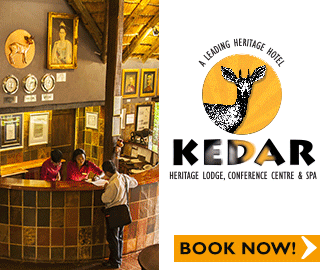
Kenneth Kaunda: Zambia's Founding Father
BY BRUCE GERMAINE 20TH APR, 2015 09:03
Can you remember those old TV images of that flamboyant politician – the one who used to wave that white handkerchief, one of the key elements and an essential part of his attire at the time ? Yes, we are talking about one of Africa’s greatest politicians and liberators from colonial powers – Mr Kenneth David Kaunda of Zambia.
With a real fear on the part of many African leaders at the time that this federation would place the power in the hands of a white minority, Kaunda, who had visited Martin Luther King Jr. in Atlanta, Georgia set into motion a campaign called Cha-cha-cha campaign, executed through Zambian African National Congress, called “positive nonviolent action”, a form of civil disobedience that was designed to protest and voice the objection of Zambian people to the idea of a federation on the part of the British.
The civil disobedience campaign produced 2 very important results: the British modified the federation policy and eventually discarded it altogether, and secondly, it resulted in the imprisonment Kenneth Kaunda and other militant leaders but not without consequences, and that was that the incarcerated leaders were elevated to a status of national heroes in the eyes of ordinary people.
What followed is the stuff that history books are made of: from 1960 the status of Zambia’s national independence movements were secured, and very importantly, so too was Kenneth Kaunda’s dominant political position confirmed within UNIP.
Upon his release from prison by the colonial government on January 8 1960, Kaunda was elected as president of the United National Independence Party (UNIP), which had been formed in 1959 by Mainza Chona, a militant activist who was disillusioned with the older ANC leadership.
1960 proved to be a pivotal year in Zambian politics, more so for UNIP which enjoyed spectacular growth by claiming well over 300 000 members by mid 1960. With such a widespread and loyal support base, the colonial power Britain invited Kaunda and several other UNIP leaders for discussions on the status of the three colonies to a conference in London, with the inevitable result of Britain announcing the formal decolonization of Zambia in 1961.
Under the leadership of Kaunda, UNIP was a political steam train gaining the majority of seats in the new legislative council when Zambia’s first elections were held in 1962.Kaunda’s further negotiation skills came to the fore when he steered Zambia, through UNIP, towards final independence from Britain in 1964 – and thus became Zambia’s first president.
Post independence politics proved to be just as exciting as before the new found freedom was achieved, and tempting as it is, it is all too easy to sit back and criticize after the fact, one cannot ever forget the negative legacy of a colonial power – and it was up to Kenneth Kaunda and UNIP to steer the Zambian ship on a path towards prosperity – no mean feat since looming tribal issues were a constant feature within the African political landscape – Zambia being no exception.
1968 marked a year of interparty political violence during the next elections with Kaunda finally imposing a one-party rule on Zambia in 1972, with a final new constitution in 1973 that ensured his party’s uncontested rule. This amendment proved to come in very useful when Kaunda was re-elected in a one party vote election in 1978 but Zambia had taken a beating under his party rule. The result of which was the slow but progressive impoverishment of Zambia with ill conceived policies such spending large sums on subsidized food, more dependence on exports of copper and foreign aid, unemployment, declining living standards, and declining education and social services.
Having survived several unsuccessful coup attempts in the 1980’s and with huge public dissatisfaction mounting and a looming credible political opposition, Kaunda legalized political parties in 1990, setting the stage for free multi party elections with the result that Kaunda and UNIP were finally beaten at the polls in 1991 by the Movement For Multiparty Democracy with a landslide victory – thus history repeated itself , this time with Frederick Chiluba at the helm.
Kaunda left office with the inauguration of MMD leader Frederick Chiluba as president on 2 November 1991. He was the second mainland African head of state to allow free multiparty elections and to have relinquished power when he lost: the first, Mathieu Kérékou of Benin, had done so in March of that year.
As is often the case with political rivals and the post Kaunda Zambia era being no exception, Chiluba’s government frequently clashed with the former first president and with the tables turned, Kenneth Kaunda was arrested on Dec 25 1997 on charges of inciting an attempted coup, but was released 6 days later, placed under house arrest until all charges were eventually withdrawn in 1998.
But it was his Malawian lineage that had come back to haunt him when in March 1999, a judge stripped Kaunda of his Zambian citizenship because his parents came from Malawi. Of course, there is much more to it within the context of brutal African politics, courtesy of the Zambian government of the day. However, not a man to take things lying down, the judgment was challenged by Kaunda and a year later his citizenship was restored - the ups and downs of African politics producing never a dull moment.
But away from politics, Dr.Kaunda also proved himself to be a great humanist. Finally in 1991, since being president of Zambia from 1964 and having lost the Presidential election, he founded the Kenneth Kaunda Peace Foundation, dedicated to the establishment of peace and conflict resolution on the continent.
After retiring, he has been involved in various charitable organisations. One of his most notable contributions has been his passion in the fight against the spread of HIV/AIDS with his own son succumbing to the disease in 1986. In a very bold step he announced his personal tragedy to the world at a press conference at Sate House in Lusaka.
From 2002 to 2004, he was an African President-in-Residence at the African Presidential Archives and Research Center at Boston University.
He is the author of various books: Black Government, 1961; Zambia Shall Be Free, 1962; A Humanist in Africa (with Colin Morris), 1966; Humanism in Zambia and its Implementation, 1967; Human in Zambia Part II; Letter to My Children, 1977; Kaunda on Violence, 1980.
In 2014 the statesman was admitted to Lusaka Trust Hospital for a fever and is being currently being seen to by doctors for age related ailments.
Born on 28 April, 1924 in Lubwa, near Chinsali, in the then Northern Rhodesia and now part of Zambia, his father hailed from Malawi, formerly known as Nyasaland, and it was this legacy that would later become yet another challenge to Zambia’s first president after Britain had relinquished colonial power.
Being the youngest of eight children, the young Kaunda, very much like other Africans who attained some form of middle class status in colonial Zambia, went to the Munali Training Centre in Lusaka from 1941 – 1943, and following in his father’s footsteps, taught at the Upper primary School at Lubwa, followed by time spent, apart from being a teacher, a missionary, choirmaster and even leading a Pathfinder Scout Group.
After 1943 and travelling from colonial Zambia, the young Kaunda spent further time as a teacher in Tanganyika – now Tanzania. But it was upon his return to Zambia in 1949 that his roots in politics started to grow into branches when he became an interpreter and advisor on African affairs to a liberal white immigrant and also member of the Northern Rhodesian Legislative Council, Sir Stewart Gore-Browne.
Being astute and intelligent, Kaunda acquired a wealth of political knowledge of how colonial governments worked, vital and necessary skills that would bode very well when later that year, he joined the first significant anticolonial organization in Northern Rhodesia, the African National Congress (ANC).
One has to bear in mind that as one reflects and writes about these great sons of Africa years later, the trials and tribulations of such men were never easy, and of course, there were many pitfalls and failures that all great leaders encountered, for the path of a leader is never an easy one – and always requires enormous responsibility, sheer guts and determination.
And from that the fate of Kenneth Kaunda was sealed for the future to become one of Africa’s great politicians, when he then became the ANC’s Secretary-General in the 1950’s – a role that ostensibly thrust him into being the chief organizing officer of the movement, and brought him into close contact with rank and file members – in hindsight a key element when he formed a new organization called the Zambia African National Congress after the then leadership of the ANC clashed over strategies in 1958-1959.
And perhaps one can argue that this is where Zambia’s independence movement really started gaining significant momentum in terms of Kaunda reeling against the colonial powers, and setting in motion a chain events, that would ultimately lead to Britain inviting Kenneth Kaunda and other leaders to the seat of colonial power in London for discussions on the three central African colonies—Southern Rhodesia, Northern Rhodesia, and Nyasaland.
Going back and before those inevitable discussions with the British rulers became a reality, Kaunda had, as the leader of the new Zambia African National Congress, skillfully hatched a militant policy against Britain’s plan for a federation of the three central African colonies.









